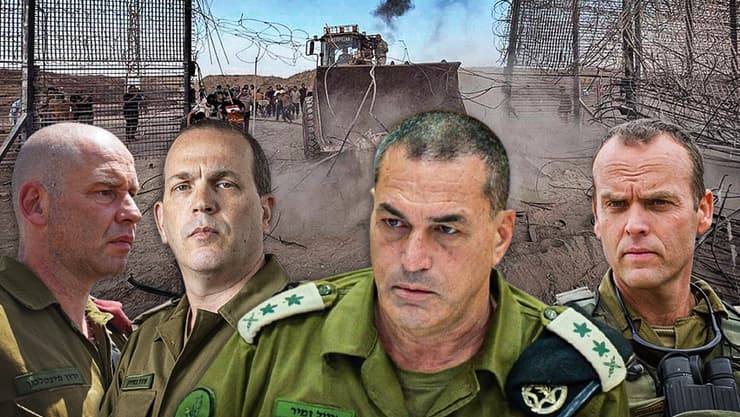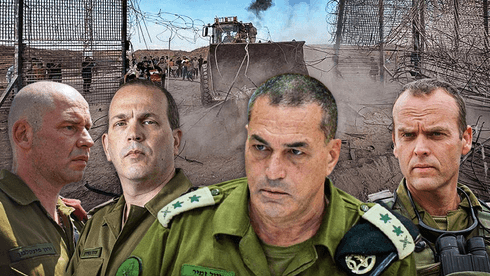More than two years after the 7/10 debacle, first command steps in the IDF: Zamir called Haliva, who replied -"I took responsibility, expect a state investigation committee." Finkelman will end his service, Sayuk was removed from the reserves, the current head of the Military Intelligence Binder received a command note - but will retire from the IDF only at the end of his term. The Chief of Staff's decision to urgently summon the officers was revealed on Ynet

Yossi Yehoshua|
A parade of dismissals at the top of the army, following the"investigation of investigations" into the October 7 massacre: Chief of Staff Eyal Zamir is carrying out the first dismissals of senior commanders this evening (Sunday) for their role in the oversight that led to the Hamas terror attack - more than two years after the massacre in the settlements surrounding the encirclement and the outbreak of war in Gaza.
As revealed this morning on Ynet, the Chief of Staff urgently summoned a number of senior officials who served before and during the Hamas attack on October 7th, and informed them of the conclusions and command steps against them - following the conclusions of the Turgeman Committee, which examined the internal investigations in the army surrounding the enormous blunder.

From right to left: Major General Binder, Chief of Staff Lt. Gen. Zamir, Ret. Gen. Besiuk and Major General Finkelman. The parade of dismissals in the army (Photo: IDF Spokesperson)
As part of the decisions made by the Chief of Staff this evening, the head of the Operations Division at the outbreak of the war, Maj. Gen. (res.) Oded Besyuk, was removed from reserve service. Besyuk, who was also designated for senior positions in the Defense Ministry, ended his role as head of the IDF Operations Division last summer.
The Chief of Staff also determined that the person who served as head of the operations brigade within the wing at the time of the massacre, currently Major General Shlomi Binder (who currently serves as head of Military Intelligence), will only receive a command note - and will not be dismissed. At his request, he will retire from the IDF only upon completion of his current role as head of Military Intelligence.
The head of the Military Intelligence Department at the time of the massacre, Maj. Gen. (res.) Aharon Haliva, was also removed from reserve service by the Chief of Staff, in a phone call. Haliva himself said that he asked not to serve in the reserves, after he had already resigned from his position and took responsibility for his part in the failure:"I asked not to be stationed in the reserves. I took full responsibility, I conducted investigations and I expect that there will be a state investigation committee."
The Chief of Staff also decided that the former commander of the Southern Command, Major General Yaron Finkelman - who resigned from his position but continued to serve in the IDF - will complete his military service, and will also be removed from reserve service. The former commander of the Gaza Division, Lt. Col. A, will also be removed from the IDF; the former head of the Operations Brigade in the Military Intelligence, Brigadier General G, will also complete his service.
The commander of 8200 at the outbreak of the war, Yossi Shariel, also received a summons yesterday to appear before the Chief of Staff today - but did not appear, he said, due to schedule constraints. The Chief of Staff also called him and informed him by phone that he had decided to remove him from reserve service."I took personal responsibility," Shariel said of the decision."I asked for forgiveness. I had no intention of remaining in the reserves because I knew what it meant."
The decisions made by Zamir this evening were made, as stated, against the background of the recommendations of the committee headed by Maj. Gen. (res.) Sami Turgeman, who was, among other things, the commander of the Southern Command and the head of the Operations Brigade. The committee examined the investigations carried out by the army into everything related to the conduct leading up to 7/10. It did not receive a mandate from Chief of Staff Zamir to recommend the dismissals, but according to Turgeman, his report had to lead to personal conclusions.
The committee's report examined, among other things, the quality of the internal military investigations, marking some of them as good investigations, some as mediocre, and some as investigations that should be rejected. But the committee actually expanded its mandate and also dealt with the issues themselves, the reasons for failure, and not just the way they were investigated. This created areas where the committee deepened its examination and investigation, and areas where it believed, sometimes due to manpower and time constraints, that less should be invested.
The committee also highlighted in its conclusions a series of issues that were not examined at all within the framework of the investigation teams established at the time, and that it recommends examining. Among other things, this concerns everything related to obtaining the various versions of Hamas' attack plan - which Israeli intelligence called the"Jericho Wall" - and the way in which the material was handled over the years. It is not clear why the Turgeman Committee, which investigated in depth various essential operational and intelligence issues, beyond what was said in the investigations, left the issue for future examination and did not examine it itself.
In one of the most controversial issues since the war - the appointment of the head of the Operations Division on October 7, Shlomi Binder, to the position of head of the Military Intelligence Directorate - the Turgeman Committee announced that extensive parts of the investigation into the functioning of the division should be re-conducted. This work has not yet been completed, but the committee sharply criticized the functioning of the Operations Division that day.
Tonight's parade of dismissals comes against the backdrop of the heated debate surrounding the question of establishing a commission of inquiry into the massacre, the events and processes that preceded it, and the manner in which the entire war was conducted. On the day the Turgeman Commission report was presented, the Chief of Staff said that he believed that an"external, systemic, multidisciplinary, and integrative" commission of inquiry should be established - and for the first time since the outbreak of the war, he did not mention the term"state." Until a few months ago, Chief of Staff Zamir, like his predecessor Herzi Halevi, called for the establishment of a state commission of inquiry, which is decreed by law, its members are appointed by the President of the Supreme Court, and has the authority to submit personal conclusions such as dismissals of all officeholders, as it deems appropriate.
But the government, led by Prime Minister Benjamin Netanyahu, strongly rejects the idea of a state committee, claiming that"half the people oppose it," while the opposition claims that the goal of Netanyahu and his partners is to whitewash their part in the October 7th failure. Last week, the government passed a resolution to establish a"national investigation committee," and later appointed a ministerial committee, led by Justice Minister Yariv Levin, to determine the mandate for investigating the October 7th failure. No comments have been published for this article, be the first to comment.

